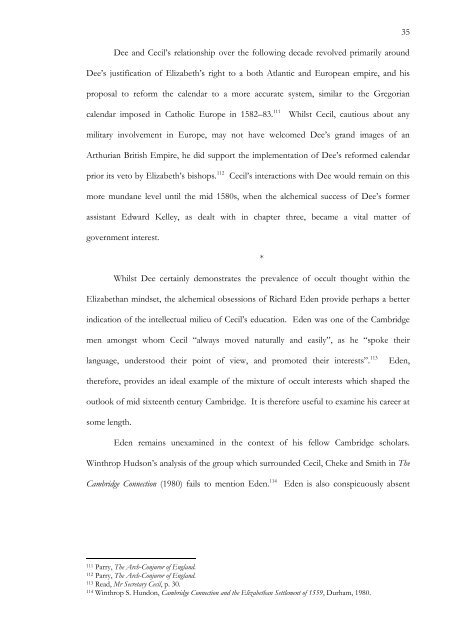The Alchemical Patronage of Sir William Cecil, Lord Burghley
The Alchemical Patronage of Sir William Cecil, Lord Burghley
The Alchemical Patronage of Sir William Cecil, Lord Burghley
Create successful ePaper yourself
Turn your PDF publications into a flip-book with our unique Google optimized e-Paper software.
Dee and <strong>Cecil</strong>‘s relationship over the following decade revolved primarily around<br />
Dee‘s justification <strong>of</strong> Elizabeth‘s right to a both Atlantic and European empire, and his<br />
proposal to reform the calendar to a more accurate system, similar to the Gregorian<br />
calendar imposed in Catholic Europe in 1582–83. 111 Whilst <strong>Cecil</strong>, cautious about any<br />
military involvement in Europe, may not have welcomed Dee‘s grand images <strong>of</strong> an<br />
Arthurian British Empire, he did support the implementation <strong>of</strong> Dee‘s reformed calendar<br />
prior its veto by Elizabeth‘s bishops. 112 <strong>Cecil</strong>‘s interactions with Dee would remain on this<br />
more mundane level until the mid 1580s, when the alchemical success <strong>of</strong> Dee‘s former<br />
assistant Edward Kelley, as dealt with in chapter three, became a vital matter <strong>of</strong><br />
government interest.<br />
*<br />
Whilst Dee certainly demonstrates the prevalence <strong>of</strong> occult thought within the<br />
Elizabethan mindset, the alchemical obsessions <strong>of</strong> Richard Eden provide perhaps a better<br />
indication <strong>of</strong> the intellectual milieu <strong>of</strong> <strong>Cecil</strong>‘s education. Eden was one <strong>of</strong> the Cambridge<br />
men amongst whom <strong>Cecil</strong> ―always moved naturally and easily‖, as he ―spoke their<br />
language, understood their point <strong>of</strong> view, and promoted their interests‖. 113 Eden,<br />
therefore, provides an ideal example <strong>of</strong> the mixture <strong>of</strong> occult interests which shaped the<br />
outlook <strong>of</strong> mid sixteenth century Cambridge. It is therefore useful to examine his career at<br />
some length.<br />
Eden remains unexamined in the context <strong>of</strong> his fellow Cambridge scholars.<br />
Winthrop Hudson‘s analysis <strong>of</strong> the group which surrounded <strong>Cecil</strong>, Cheke and Smith in <strong>The</strong><br />
Cambridge Connection (1980) fails to mention Eden. 114 Eden is also conspicuously absent<br />
111 Parry, <strong>The</strong> Arch-Conjuror <strong>of</strong> England.<br />
112 Parry, <strong>The</strong> Arch-Conjuror <strong>of</strong> England.<br />
113 Read, Mr Secretary <strong>Cecil</strong>, p. 30.<br />
114 Winthrop S. Hundon, Cambridge Connection and the Elizabethan Settlement <strong>of</strong> 1559, Durham, 1980.<br />
35















